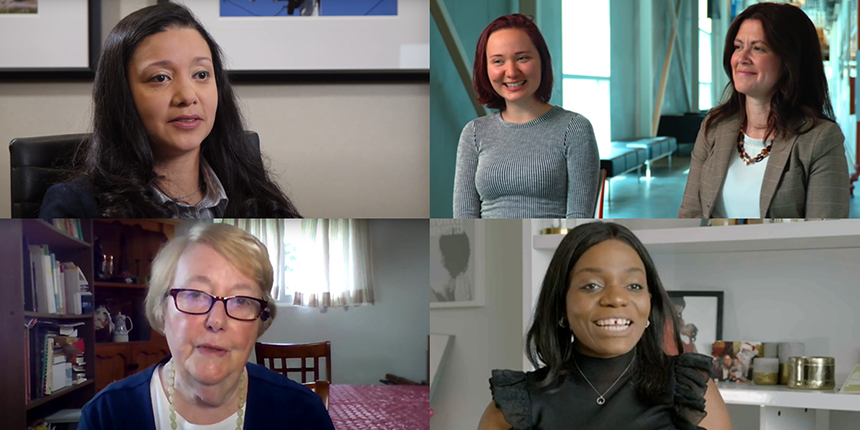


June 23, 2022, is International Women in Engineering Day (INWED), a day to raise the profile of women and gender-diverse people in engineering. INWED highlights the important contributions that women and gender-diverse engineers make in their communities through their engineering work. INWED underscores that a more equitable, diverse, and inclusive profession improves the quality of engineering work and its impact.
This week, in celebration of INWED, Engineers Canada is shining a spotlight on five women and non-binary people in engineering who are not only recognized for their engineering accomplishments, but who are also equity, diversity, and inclusion (EDI) leaders in their workplaces and in their profession. These individuals use their platforms and experiences to further underrepresented people’s presence in engineering. They are daring to be part of the solution and helping to build towards a brighter future. In the videos below, they describe their engineering work, share their perspectives on EDI in engineering, and #ImaginetheFuture of the engineering profession.
Liz Palmera-Nunez, P.Eng.
Liz Palmera-Nunez is the Manager, T&D Engineering, at Newfoundland Power, where she uses her engineering expertise to manage the design and construction of multimillion dollar transmission line projects to bring high-voltage electricity over long distances. She also serves on two boards—with the Professional Engineers and Geoscientists of Newfoundland and Labrador, and the Newfoundland and Labrador Housing Corporation—where she brings her engineering and equity, diversity, and inclusion (EDI) skills to the governance table to impact change.
As an immigrant, a person of colour, and a female in a traditionally male-dominated field, Liz understands the reality of many marginalized people in engineering. She is motivated by her own experiences, as well as her three daughters, who inspire her to role model equity, diversity, and inclusion practices that will strengthen teams and organizations, and that will build workplaces where everyone is treated equally.
Monique Frize, OC, PhD, P.Eng.
Monique Frize is a Distinguished Research Professor and Professor Emeritus at Carleton University, as well as a recipient of the Order of Canada and the Governor General's Award in Commemoration of the Persons Case. She has been a leader and innovator at the forefront of the field of biomedical engineering throughout her decades-long career. Among her many accomplishments, she is particularly proud of designing a neonatal intensive care system that predicts ventilator needs, complications, the length and duration of intensive care, and mortality so that interventions can be taken in advance of an event.
On what was supposed to be her first day as the Nortel-NSERC Chair for Women in Engineering at the University of New Brunswick on December 11, 1989, Monique was instead at the Montreal funeral for the victims of the tragedy at École Polytechnique. This event focused attention on women in engineering, and motivated Monique to dedicate herself to changing the culture of engineering. Throughout her career, Monique has been a champion for women in engineering, driving the development of a committee report for NSERC with recommendations to advance women in engineering, being integral in the establishment of the five NSERC chairs for women in engineering around the country, and frequently visiting classrooms to inspire an interest in engineering for girls and young women.
Jasmine McDermott and Kerry Black, PhD, P.Eng.
Jasmine McDermott is a mechanical engineering student at the University of Calgary and is the Founder and President of the Calgary Indigenous STEAM Student’s Association. When Jasmine chose to study engineering, they saw the many ways in which engineering had failed Indigenous communities. It became important for them to recognize their place as an Indigenous person studying engineering, and to make the most of the opportunities they had been given to positively impact their community. As an Indigenous student in engineering, Jasmine is committed to creating more inclusive spaces for Indigenous students in science, technology, engineering, and math (STEM), establishing a new student club, the Calgary Indigenous STEAM Student’s Association.
Kerry Black is an Assistant Professor and Schulich Research Chair (Integrated Knowledge, Engineering & Sustainable Communities), in the Center for Environmental Engineering Research and Education and the Department of Civil Engineering, at the University of Calgary. Most of Kerry’s work is with First Nations people, focusing on issues of sustainable infrastructure and looking at non-traditional approaches and solutions to inherently technical engineering problems. Kerry champions equity, diversity, and inclusion in engineering, and recognizes the value that individuals gain from learning from the experiences of others. It’s only through diversity that engineering can tackle complex challenges in a more inclusive way, and in a way that is more contextually relevant.
Menelika Bekolo, M.ing., ing.
Menelika Bekolo holds bachelor’s and master’s degrees in electrical engineering from Polytechnique Montréal and has worked in the energy sector for the past decade. An electrical engineer at Hydro-Québec, Menelika was recently named one of Engineers Canada’s EDI Leaders during the 2022 30 by 30 Conference in recognition of her leadership in her workplace to further women and gender diverse people’s presence in the engineering profession.
Menelika is deeply committed to promoting the engineering profession and raising its profile among women and young people. She has instigated and organized several initiatives to promote and pursue diverse work environments, including welcoming engineering students into her workplace so that they can not only meet other engineers, but so that they can also better understand engineering workplaces. She is also an active mentor, and often visits classrooms to encourage girls and young women to explore engineering.


